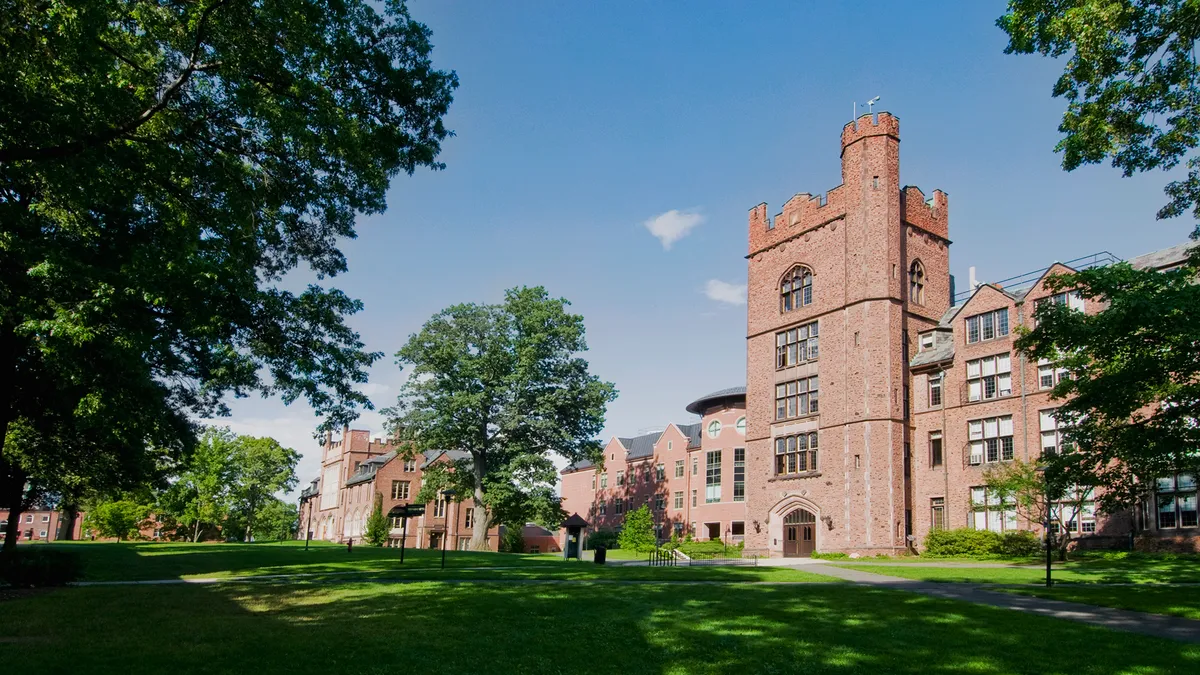Taking on a new leadership role can be challenging, let alone one that requires guiding an entire college or university toward a set of common goals. Administrators — whether president, provost or other leader — are expected to be involved in all facets of their institution, and they face particularly difficult hurdles that range from fundraising amid a decline in state dollars to balancing free speech rights with the need for safety on campus.
We asked six college administrators from institutions of all sizes across the U.S. what has surprised them most in their current role and what they wish they knew before stepping into the position. Here's what they had to say.
Meredith Harper Bonham, vice president for student affairs, Kenyon College:
"I wish I had known how consuming this job can be and the necessity of taking time for myself and my family. In a small residential college environment, I felt there was an expectation I show up for just about everything. While there is some truth to this, I probably took it to an extreme during my first year and definitely felt the physical toll. Since then, I have learned the importance of getting enough sleep, taking time to exercise and making healthy eating choices. I now try to model those priorities for my staff, and this year we started an 'Eat Well, Sleep Well, Be Well' campaign for students.
"Crises will happen, and sometimes I have to drop everything to deal with them. But after that crazy first year, I rearranged my meetings schedule to allow more blocks of time for work during the day so I can spend time with my family in the evenings. I also try to make strategic choices about my visibility on campus. I value my time with students, but they don't really need me to show up to everything."
Jonathan Holloway, provost, Northwestern University:
"I never aspired to be a provost. My earlier view of senior administration was that the president had the duty of setting the university's agenda and encouraging friends of the university to support that agenda through their generosity. To accomplish the latter task, the president needed to talk about the institution in enthusiastic and glowing terms. The provost, on the other hand, needed to find ways to temper the president's enthusiasm and be the person willing to offer a private 'no' to the president's public 'yes.' As I didn't want to be tasked with that responsibility, I knew the job wasn't for me.
"Since I arrived at Northwestern, I discovered that while I must give that unambiguous 'no' on occasion, I get to shape and guide our academic vision, while spending considerable time with brilliant and passionate people who, cumulatively, possess expertise about everything that is known. Even better, I get to provide access to resources that allow them to realize their goals. This is a true delight that I never knew would be mine when I took up the job I never aspired to have."
Nicholas Jones, executive vice president and provost, Penn State University:
"When I came to Penn State in 2013, I was eager to make a positive difference, and I recognized I would have ample opportunities to do so. While I knew Penn State was a world-class research institution, I have come to appreciate the holistic approach to interdisciplinary research and institution-wide problem solving.
"It is critical to have shared goals that give students, staff, faculty, department heads, deans and chancellors the opportunity to help shape the direction of our university, and to leverage our strengths for the greater good and maximum impact. Penn State’s approach to strategic planning is unique, and I have had the honor of working with our faculty to solve real-world problems – for the citizens of Pennsylvania and beyond. The possibilities are limited only by our imagination. We, and I, continue to learn each day. The number, depth, and breadth of opportunities have far exceeded what I could have imagined when I started my journey at Penn State."
Gail O. Mellow, president, LaGuardia Community College (LCC):
"I've spent most of my career at community colleges — first as a professor, then as provost and finally as president. When I became president of LCC in 2000, the funding inequities between community colleges and four-year colleges were not new to me. What has surprised me is that this inequity persists today. I and other community college leaders have worked hard to remind elected officials that community colleges educate nearly half of U.S. college students, with many more low-income students than at four-year colleges. Yet, nothing has changed.
"Ignoring the support poor students need has created a separate but unequal system with a permanent underclass. While tuition is often covered by Pell and TAP grants, the costs of housing, food, transportation and family responsibilities can become insurmountable. That's why despite being two-year colleges, most students take three years or more to graduate. Or they end up dropping out.
"We need to flip the narrative and celebrate the drive of low-income students. Their perseverance while working, caring for children or tending to other family responsibilities is a supreme accomplishment. When they earn their associate degree, it benefits their entire family. Now that's something to celebrate."
Scott Pulsipher, president, Western Governors University (WGU):
"My professional background prior to WGU was focused in technology, which made sense for an institution known for innovation in higher education. What I did not anticipate, particularly in light of WGU's reputation as a disruptive innovator, was the degree to which tradition still drives beliefs about how higher education should be delivered and how we should measure its quality.
"As an Amazon alum, I am reminded of something Jeff Bezos said, which is that invention or re-invention often requires a willingness to be misunderstood for long periods of time. That said, innovation without a positive impact is just a bad idea, and WGU is focused on measuring everything we do. Higher education will benefit as we continue to improve the relevance, reliability and transparency of the results we deliver to our students and their employers."
John Williams, president, Muhlenberg College:
"When I came to Muhlenberg College, I was well-versed in the headwinds that higher education was facing, but I was not expecting the intensity with which they have come to take hold. The shifting demographic landscape and the prevailing public discourse have moved us to alter our course at times and, in some instances, be more reactionary than would be my preference.
"Another thing I really wish I had known — and it's related to the challenges that colleges and universities are experiencing — was how much extra work it would take to incorporate data-driven analytics in ways that have long been commonplace in the business world. Finally, I never knew the Lehigh Valley area of Pennsylvania was so breathtakingly beautiful!"



















